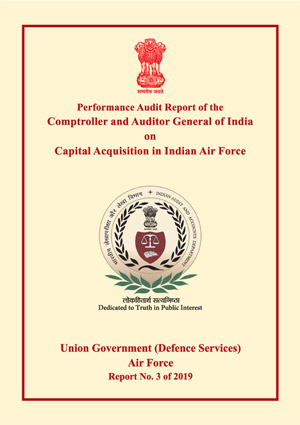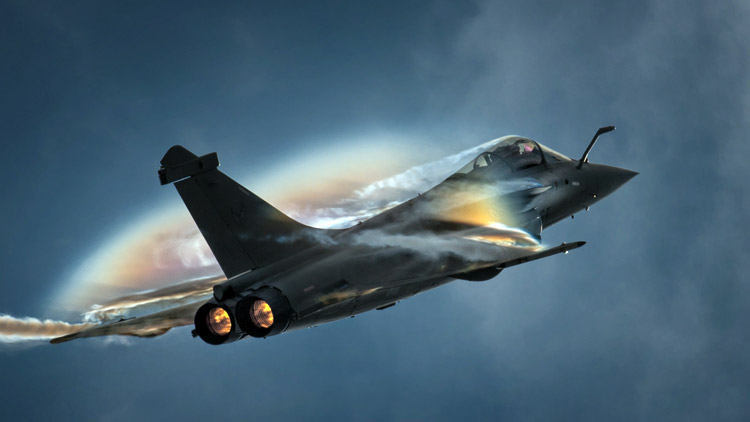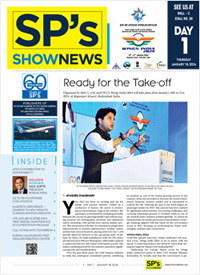CAG finds NDA's Rafale deal 2.86% cheaper than UPA's negotiated price
Reprieve for Modi Government but Opposition unlikely to relent on lack of guarantees

contracts, including the Rafale deal, was tabled in
Parliament on February 13
The Comptroller and Auditor General (CAG)'s audit has established that the 7.8 Billion Euro Inter-Governmental deal between India and France in 2016 for 36 Rafale fighters was 2.86 per cent cheaper than the one negotiated but not signed by the previous UPA Government.
The federal auditor's finding is a definite reprieve for the Narendra Modi Government but is unlikely to make the Opposition Congress relent from its insistence that there's a scam in the deal. The Congress, which led the previous UPA Government, has assailed the Modi Government over the Rafale price, alleging that it is three times higher than what was negotiated in 2012.
While the CAG's findings puncture the Congress' claims on price, snatching away its principal weapon in attacking the deal, the audit report could give fresh ammunition to the Congress over the absence of a sovereign guarantee and bank and performance guarantees.
The audit has revealed that Dassault Aviation's 2007 Rafale bid provided for financial and performance guarantees, the costs of which were embedded in the price. This was in compliance with the terms of the Medium Multi-Role Combat Aircraft (MMRCA) tender, in which there were five other contenders. Dassault won the competition for supplying 126 fighter jets, but the contract could not be signed due to an impasse in negotiations over Dassault's refusal to accept responsibility for the aircraft made under Transfer of Technology at Hindustan Aeronautics Limited (HAL), and the latter's insistence on 2.7 times more manpower costs, which would have pushed up the price.
The price of the bare aircraft was found the same after applying the escalation formula. The elaborate, game changing weapons package is also cheaper by 1.05 per cent than the audit-aligned price in the earlier offer. There is a significant 17.08 per cent saving on India-Specific Enhancements

Post the change in Government in 2014, the procurement was truncated to 36 Rafale jets under a Government-to-Government import deal, with the licensed production at HAL element taken out. The earlier tender for 126 fighters was aborted. The contract for 36 Rafale jets along with the weapons package and the maintenance support was signed on September 23, 2016.
The CAG's Performance Audit of 11 Indian Air Force contracts from 2012-13 to 2017-18, including the one for 36 Rafale jets and the earlier abortive MMRCA procurement process, which was tabled in Parliament on February 13 disclosed that the Modi Government yielded to the French after they refused to give the guarantees.
Savings accruing to the French supplier from not furnishing a bank guarantee against the 15 per cent Indian advance, and a 10 per cent performance guarantee for five-and-a half years should have been passed on to the Indian side but were not, the report observes.
"In case of any breach of agreement Indian party (Ministry) would have to first settle it through Arbitration directly with the French vendors. If the Arbitration award were in favor of Indian party and the French vendor fails to honor the award (make the paymentís claim), Indian party should exhaust all available legal remedies. Only then the French Government would make these payments on behalf of the vendors," the audit report noted
Similarly, the Modi Government yielded to the French in not insisting on a Sovereign Guarantee and payments through an escrow account. In stead, it agreed to a Letter of Comfort by the French Prime Minister offering assurances of delivering the deal.
Although no such sovereign guarantees have been obtained by successive Indian Governments in Government-to-Government defence deals with Russia, the US and UK, there's an assurance of having successfully completed several such deals with them, whereas this is the first such deal with France.
"In case of any breach of agreement Indian party (Ministry) would have to first settle it through Arbitration directly with the French vendors. If the Arbitration award were in favor of Indian party and the French vendor fails to honor the award (make the paymentís claim), Indian party should exhaust all available legal remedies. Only then the French Government would make these payments on behalf of the vendors," the audit report noted.
The CAG made the price comparisons by aligning various elements of pricing offered by Dassault for the Rafale in 2007 in the MMRCA tender with those it did in 2015, using the price escalation formula.
"The contract consisted of six different packages - Flyaway Aircraft Package, Maintenance package, Indian Specific Enhancements, Weapon Package, Associated Services and Simulator Package. There were a total of 14 items under these six packages. Item wise analysis of prices showed that, the contracted price of seven items were higher than the aligned price, three were same and four were lower," the report states.
While the new deal was 2.86 per cent cheaper overall, the price of the bare aircraft was found the same after applying the escalation formula. The elaborate, game changing weapons package is also cheaper by 1.05 per cent than the audit-aligned price in the earlier offer. There is a significant 17.08 per cent saving on India-Specific Enhancements over the audit-aligned price in the earlier offer. The audit also revealed that the IAF no longer wanted four of these enhancements, but were bound by the terms of the agreement to arrive at a deal for the Rafale in the same configuration that was negotiated but not signed before 2014. The Maintenance element of the 36 Rafale contract - or Performance Based Logistics - is dearer by about 6 per cent.
The audit also established an improvement of one month in the delivery schedule of the 2016 contract.
The CAG audit also covers the aborted MMRCA procurement process.





